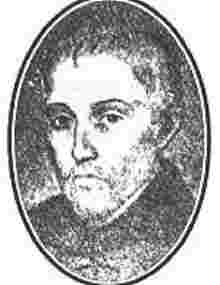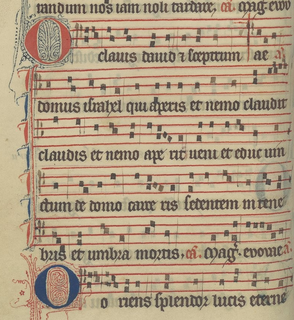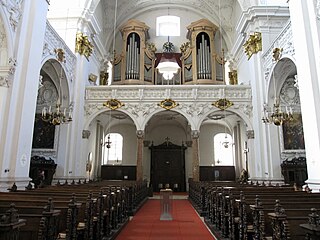Related Research Articles

In Western classical music, a motet is mainly a vocal musical composition, of highly diverse form and style, from the high medieval music to the present. The motet was one of the pre-eminent polyphonic forms of Renaissance music. According to Margaret Bent, "a piece of music in several parts with words" is as precise a definition of the motet as will serve from the 13th to the late 16th century and beyond. The late 13th-century theorist Johannes de Grocheo believed that the motet was "not to be celebrated in the presence of common people, because they do not notice its subtlety, nor are they delighted in hearing it, but in the presence of the educated and of those who are seeking out subtleties in the arts".

John Taverner was an English composer and organist, regarded as one of the most important English composers of his era. He is best-known for Missa Gloria tibi Trinitas and The Western Wynde Mass, and Missa Corona Spinea is also often viewed as a masterwork.

Tomás Luis de Victoria was the most famous composer in 16th-century Spain, and was one of the most important composers of the Counter-Reformation, along with Giovanni Pierluigi da Palestrina and Orlando di Lasso. Victoria was not only a composer but also an accomplished organist and singer as well as a Catholic priest. However, he preferred the life of a composer to that of a performer.
Antoine Brumel was a French composer. He was one of the first renowned French members of the Franco-Flemish school of the Renaissance, and, after Josquin des Prez, was one of the most influential composers of his generation.

Pierre de la Rue was a Franco-Flemish composer and singer of the Renaissance. His name also appears as Piersson or variants of Pierchon and his toponymic, when present, as various forms of de Platea, de Robore, or de Vico. A member of the same generation as Josquin des Prez, and a long associate of the Habsburg-Burgundian musical chapel, he ranks with Agricola, Brumel, Compère, Isaac, Obrecht, and Weerbeke as one of the most famous and influential composers in the Netherlands polyphonic style in the decades around 1500.

Loyset Compère was a Franco-Flemish composer of the Renaissance. Of the same generation as Josquin des Prez, he was one of the most significant composers of motets and chansons of that era, and one of the first musicians to bring the light Italianate Renaissance style to France.
Jean Mouton was a French composer of the Renaissance. He was famous both for his motets, which are among the most refined of the time, and for being the teacher of Adrian Willaert, one of the founders of the Venetian School.

The O Antiphons are Magnificat antiphons used at vespers on the last seven days of Advent in Western Christian traditions. They likely date to sixth-century Italy, when Boethius refers to the text in The Consolation of Philosophy. They subsequently became one of the key musical features of the days leading up to Christmas.

"Regina caeli" is a musical antiphon addressed to the Blessed Virgin Mary that is used in the liturgy of the Roman Rite of the Catholic Church during the Easter season, from Easter Sunday until Pentecost. During this season, it is the Marian antiphon that ends Compline and it takes the place of the traditional thrice-daily Angelus prayer.

Johannes Hendrikus Hubert "John" de Mol Jr. is a Dutch media tycoon, television producer and billionaire. De Mol is one of the men behind production companies Endemol and Talpa. He is known for being the creator of several major reality television formats including Big Brother, Fear Factor and The Voice.

Linda Margaretha de Mol is a Dutch actress and television presenter in the Netherlands and Germany. She is the sister of Endemol co-founder John de Mol. She has her own magazine called LINDA.
The decade of the 1530s in music involved some significant events, publications, compositions, births, and deaths.

"Ave Maria" is a popular and much-recorded setting of the Latin prayer Ave Maria, originally published in 1853 as "Méditation sur le Premier Prélude de Piano de J.S. Bach". The piece consists of a melody by the French Romantic composer Charles Gounod that he superimposed over an only very slightly changed version of Bach's Prelude No. 1 in C major, BWV 846, from Book I of his The Well-Tempered Clavier, published in 1722. It was published with a French text in 1853, but it was the 1859 version with the Latin Ave Maria which became popular.
Pau Villalonga was a Spanish composer of sacred polyphony.
Antonio Rodríguez de Hita was a Spanish composer.

Ave Maria, WAB 6, is a sacred motet by Anton Bruckner, a setting of the Latin prayer Ave Maria. He composed it in Linz in 1861 and scored the short work in F major for seven unaccompanied voices. The piece, sometimes named an Offertorium, was published in Vienna in 1867. Before, Bruckner composed the same prayer in 1856 for soprano, alto, a four-part mixed choir, organ and cello, WAB 5. Later, he set the text in 1882 for a solo voice (alto) and keyboard, WAB 7.
Balthasar Resinarius was a German composer, and a Lutheran bishop, one of the first Lutherans in Bohemia.
References
- ↑ The international cyclopedia of music and musicians - Page 438 Oscar Thompson, Nicolas Slonimsky - 1958 "Dutch composer, known chiefly for his Ave decus virginum for four voices."
- ↑ Monatshefte für Musikgeschichte Gesellschaft für Musikforschung - Volumes 29 à 30 - Page 66 "... Chorbuches aus dem 15. Jh. (Man verbessere dort die beiden Autornamen C. Kupsch in C. Rupseh und Raulequin de Mol in Ranlequin de Mol)."